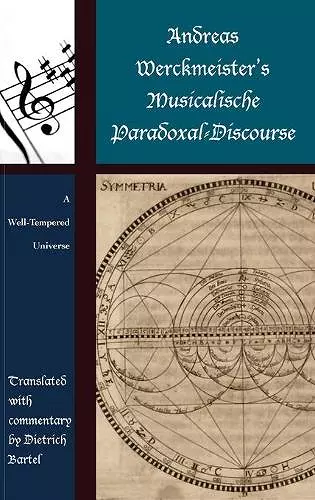Andreas Werckmeister’s Musicalische Paradoxal-Discourse
A Well-Tempered Universe
Format:Hardback
Publisher:Bloomsbury Publishing PLC
Published:22nd Nov '17
Currently unavailable, and unfortunately no date known when it will be back

Andreas Werckmeister (1645 – 1706), a late seventeenth-century German Lutheran organist, composer, and music theorist, is the last great advocate and defender of the Great Tradition in music, with its assumptions that music is a divine gift to humanity, spiritually charged yet rationally accessible, the key being a complex of mathematical proportions which govern and are at the root of the entire universe and all which that embraces. Thus understood, music is the audible manifestation of the order of the universe, allowing glimpses, sound-bites of the very Creator of a well-tempered universe, and of our relationship to each other, our environment, and the divine powers which placed us here. This is the subject matter of the conversation which Werckmeister wishes to have with us, his readers, particularly in his last treatise, the Musicalische Paradoxal-Discourse. But he does not make it easy for today’s readers. He assumes certain proficiencies from his readers, including detailed biblical knowledge, a fluency in Latin, and a familiarity with treatises and publications concerning music, theology, and a number of related disciplines. He writes in a rather archaic German, riddled with obscure references which require a thorough explanation. With its extensive commentary and translation of the treatise, this book seeks to bridge Werckmeister’s world with that of the twenty-first century. Werckmeister wrote for novice and professional musicians alike, an author who wanted to consider with his readers the basic and existential questions and issues regarding the wondrous art of music, questions as relevant then as they are now.
Bartel’s English translation of Werckmeister’s German is both coherent and idiomatic and makes an important document from the German baroque available to a much wider audience. * Notes: Quarterly Journal of the Music Library Association *
Bartel brings to this translation decades of teaching experience and research into German literature and culture. He does everything in his power to assist the reader of this book. . . . Bartel’s pedagogical heart is apparent throughout. From the first page one senses a caring mentor willing the student to understand. I have read Musicalische Paradoxal-Discourse numerous times in the original German, but it was not until Bartel’s ‘tutoring’ through this book that I understood how blind I had been to some of Werckmeister’s unstated implications, one of which has propelled my research along an exciting new line of inquiry. * Swedish Journal of Music Research *
In his last writing, Musicalische Paradoxal-Discourse (1707), Andreas Werckmeister, one of the great minds of musical aesthetics and theory, confronts a series of paradoxes at the interfaces between faith and reason, mind and body, speculation and experience. The author, himself, presents us, today, with a further paradox: he was one the last exponents of an ancient cosmological understanding of music—a number-based conception in the tradition of Pythagoras and Plato—yet he was also one of the first to advocate for major-minor tonality, equal temperament, and a notation system that would treat each of the twelve pitch classes and all enharmonically equivalent intervals in a like manner. Dietrich Bartel’s translation renders Werckmeister’s notoriously difficult and often obscure German in clear and precise English, making it truly accessible to an international readership for the first time. Bartel’s magisterial introduction places this publication an illuminating context, and traces, with precision and nuance, the evolution of Werckmeister’s thinking about temperament. -- John Walter Hill, professor emeritus, University of Illinois, Urbana-Champaign
ISBN: 9781498566346
Dimensions: 240mm x 161mm x 18mm
Weight: 404g
174 pages